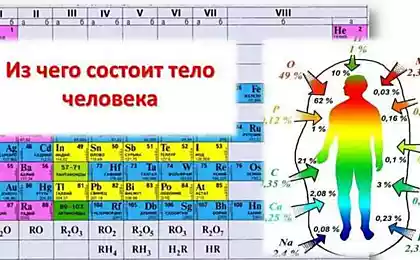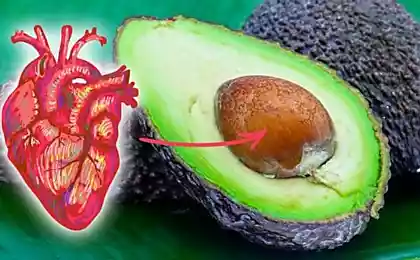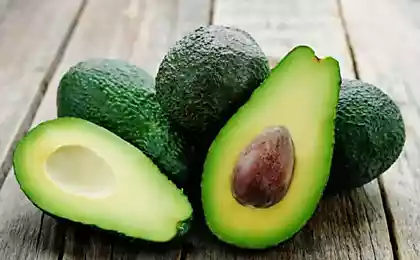665
4 beeps that indicate a potassium deficiency
A potassium deficiency can negatively affect the nerves and nervous connections of the cells of the muscles of the digestive system, heart, and other muscles.
A large part of the potassium in the human body contains in the cells.
Balanced diet easily helps to maintain a stable level of potassium in the blood.
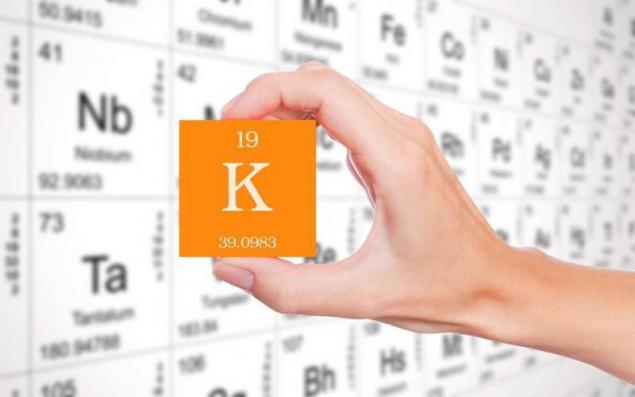
If you eat wrong, often consume junk food and foods low in nutrients, you can manifest a deficiency of potassium.
How to know whether your body is potassium deficiency? About the lack of this mineral can indicate the following symptoms.
Carefully read them and think, if you do not suffer from deficiency of potassium.
1. You feel tired and weak
First signs of potassium deficiency can be:
The latter applies not only to the hands and feet but also the muscles of the respiratory and digestive system.

A potassium deficiency inhibits the rapid recovery of the energy balance of cells. Because of this, the muscles becomes more difficult to decline.
Weakness, spasms, numbness and tingling in the muscles — all this may indicate that the deficiency of potassium in the human body progresses.
If these symptoms seem familiar, we recommend that you immediately consult a doctor for an examination.
2. Irregular heart rhythm
Prolonged potassium deficiency may break our heart. The first symptoms of this are irregular heartbeat for no apparent reason.
If it manifests itself after an intensive workout, and you're not used to physical activity, this is normal. But the same can be said about the unusual rhythm of the heart, which appears for no reason, during the execution of business as usual.
A chronic potassium deficiency can cause changes in the structure of the kidneys and lead to violations of the functions of these organs.
In some cases, because of the shortage of potassium slows down the heart rate, resulting in dizziness.
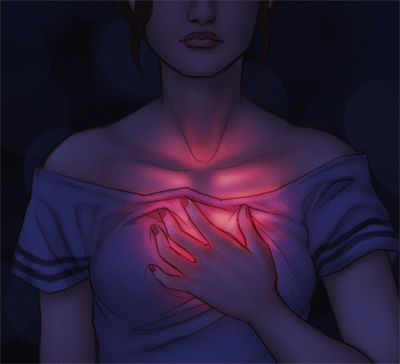
There are different types of arrhythmia. In some cases, the human heart begins to beat too fast, while others, on the contrary, the heart rate slows down. In the most severe cases, the heartbeat becomes uneven.
Each type of arrhythmia is manifested by certain symptoms, from dizziness to fainting. Irregular heart rhythm may be accompanied by feeling short of breath, chest pain, and diaphoresis.
3. High blood pressure
The increase in blood pressure of a person is influenced by many factors, including:
Potassium deficiency is also one of the determining factors.
As high and too low potassium levels can cause fluctuations in blood pressure.
According to the research results, abuse of salty food and lack of fruits and vegetables in the human diet increase the risk of developing hypertension.
4. Cramps
Contraction and relaxation of muscles of the human body depends on potassium. Muscle relaxation can be conscious or unconscious. It depends on the type of muscle.
When our body lacks potassium, the muscle becomes hard to relax and remain lightweight. Because of this there are convulsions. If you are familiar painful spasms in the muscles of the legs, it is likely that this problem is due to a potassium deficiency.
This problem is often concerned about athletes who spend too much time in training. If you play sports, it is recommended from time to time to take a mineral drink with potassium.
Foods high in potassium
When it comes to potassium, the first product that comes to our mind is banana. Indeed, these fruits contain large amounts of this mineral. But there are other products, which should not be forgotten.
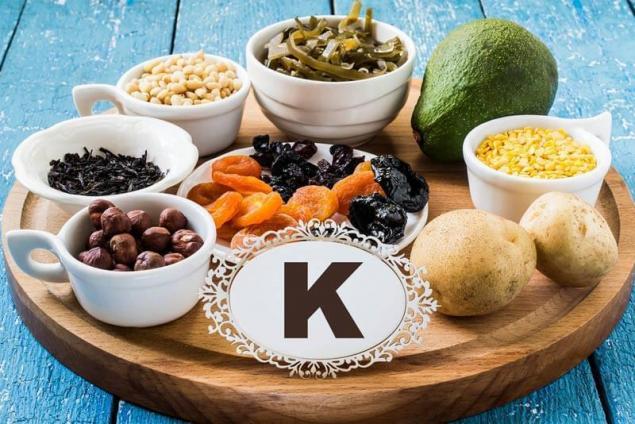
So, what kind of food is recommended to pay attention in order to cope with the shortage of potassium?
Chard
Chard is fairly easy to grow at home. Try to do it! The fact that only 100 g of Swiss chard contains 380 mg. of potassium. Can use Swiss chard for salads and cocktails.
Banana
As you know, these fruits are a rich source of potassium. In 100 g of banana pulp contains 370 mg of potassium.
It should be borne in mind that if you suffer from diabetes, to abuse the bananas are not recommended.
Potatoes
If you are a lover of mashed potatoes, it is unlikely that you are familiar with the problem of potassium deficiency.
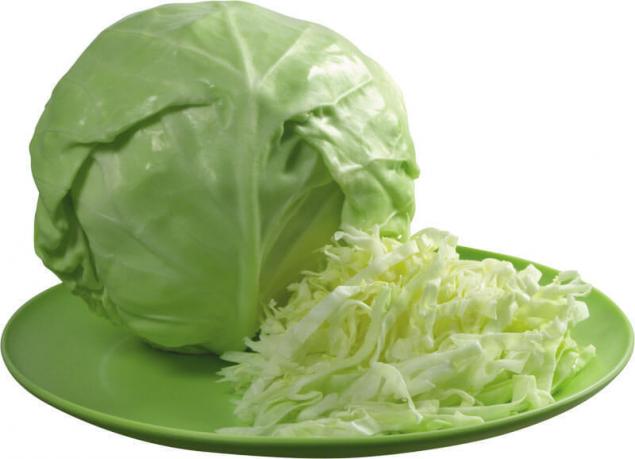
Another wonderful vegetable that is a rich source of potassium.
In 100 g of cabbage contains 450 mg. of this mineral.
Try often make cabbage salads and dishes cooked in the oven.
Avocado
100 g of this fruit contain the 487 mg of potassium. Can you use avocado for cooking cold sauces, salads and sandwiches.
Spinach
Another seasonal vegetable that can be used for cooking various dishes.
100 g of spinach contains 554 mg of potassium.
Also interesting: the Role of taurine in the metabolism and its deficiency in the body
Some signs of magnesium deficiency in the body
Maybe when you think about nutrients and the food you need to eat in order to have good health, you don't think about the potassium deficiency. Do not forget about this mineral. It plays an important role in many vital processes of the human body.
Now you know what foods help to cope with deficiency of potassium. It remains only to frequently include them in your diet.published
Source: steptohealth.ru/4-signala-kotorye-ukazyvayut-na-defitsit-kaliya/
A large part of the potassium in the human body contains in the cells.
Balanced diet easily helps to maintain a stable level of potassium in the blood.

If you eat wrong, often consume junk food and foods low in nutrients, you can manifest a deficiency of potassium.
How to know whether your body is potassium deficiency? About the lack of this mineral can indicate the following symptoms.
Carefully read them and think, if you do not suffer from deficiency of potassium.
1. You feel tired and weak
First signs of potassium deficiency can be:
- muscle pain,
- cramps,
- atypical weakness.
The latter applies not only to the hands and feet but also the muscles of the respiratory and digestive system.

A potassium deficiency inhibits the rapid recovery of the energy balance of cells. Because of this, the muscles becomes more difficult to decline.
Weakness, spasms, numbness and tingling in the muscles — all this may indicate that the deficiency of potassium in the human body progresses.
If these symptoms seem familiar, we recommend that you immediately consult a doctor for an examination.
2. Irregular heart rhythm
Prolonged potassium deficiency may break our heart. The first symptoms of this are irregular heartbeat for no apparent reason.
If it manifests itself after an intensive workout, and you're not used to physical activity, this is normal. But the same can be said about the unusual rhythm of the heart, which appears for no reason, during the execution of business as usual.
A chronic potassium deficiency can cause changes in the structure of the kidneys and lead to violations of the functions of these organs.
In some cases, because of the shortage of potassium slows down the heart rate, resulting in dizziness.

There are different types of arrhythmia. In some cases, the human heart begins to beat too fast, while others, on the contrary, the heart rate slows down. In the most severe cases, the heartbeat becomes uneven.
Each type of arrhythmia is manifested by certain symptoms, from dizziness to fainting. Irregular heart rhythm may be accompanied by feeling short of breath, chest pain, and diaphoresis.
3. High blood pressure
The increase in blood pressure of a person is influenced by many factors, including:
- genetic predisposition,
- completeness,
- the use of salt.
Potassium deficiency is also one of the determining factors.
As high and too low potassium levels can cause fluctuations in blood pressure.
According to the research results, abuse of salty food and lack of fruits and vegetables in the human diet increase the risk of developing hypertension.
4. Cramps
Contraction and relaxation of muscles of the human body depends on potassium. Muscle relaxation can be conscious or unconscious. It depends on the type of muscle.
When our body lacks potassium, the muscle becomes hard to relax and remain lightweight. Because of this there are convulsions. If you are familiar painful spasms in the muscles of the legs, it is likely that this problem is due to a potassium deficiency.
This problem is often concerned about athletes who spend too much time in training. If you play sports, it is recommended from time to time to take a mineral drink with potassium.
Foods high in potassium
When it comes to potassium, the first product that comes to our mind is banana. Indeed, these fruits contain large amounts of this mineral. But there are other products, which should not be forgotten.

So, what kind of food is recommended to pay attention in order to cope with the shortage of potassium?
Chard
Chard is fairly easy to grow at home. Try to do it! The fact that only 100 g of Swiss chard contains 380 mg. of potassium. Can use Swiss chard for salads and cocktails.
Banana
As you know, these fruits are a rich source of potassium. In 100 g of banana pulp contains 370 mg of potassium.
It should be borne in mind that if you suffer from diabetes, to abuse the bananas are not recommended.
Potatoes
If you are a lover of mashed potatoes, it is unlikely that you are familiar with the problem of potassium deficiency.
- Every 100 g of potatoes contain 418 mg. of potassium.
- Best of all, this mineral is stored in the potatoes, cooked in the oven, steamed or baked on fire.
- Try to avoid fried potatoes.

Another wonderful vegetable that is a rich source of potassium.
In 100 g of cabbage contains 450 mg. of this mineral.
Try often make cabbage salads and dishes cooked in the oven.
Avocado
100 g of this fruit contain the 487 mg of potassium. Can you use avocado for cooking cold sauces, salads and sandwiches.
Spinach
Another seasonal vegetable that can be used for cooking various dishes.
100 g of spinach contains 554 mg of potassium.
Also interesting: the Role of taurine in the metabolism and its deficiency in the body
Some signs of magnesium deficiency in the body
Maybe when you think about nutrients and the food you need to eat in order to have good health, you don't think about the potassium deficiency. Do not forget about this mineral. It plays an important role in many vital processes of the human body.
Now you know what foods help to cope with deficiency of potassium. It remains only to frequently include them in your diet.published
Source: steptohealth.ru/4-signala-kotorye-ukazyvayut-na-defitsit-kaliya/





